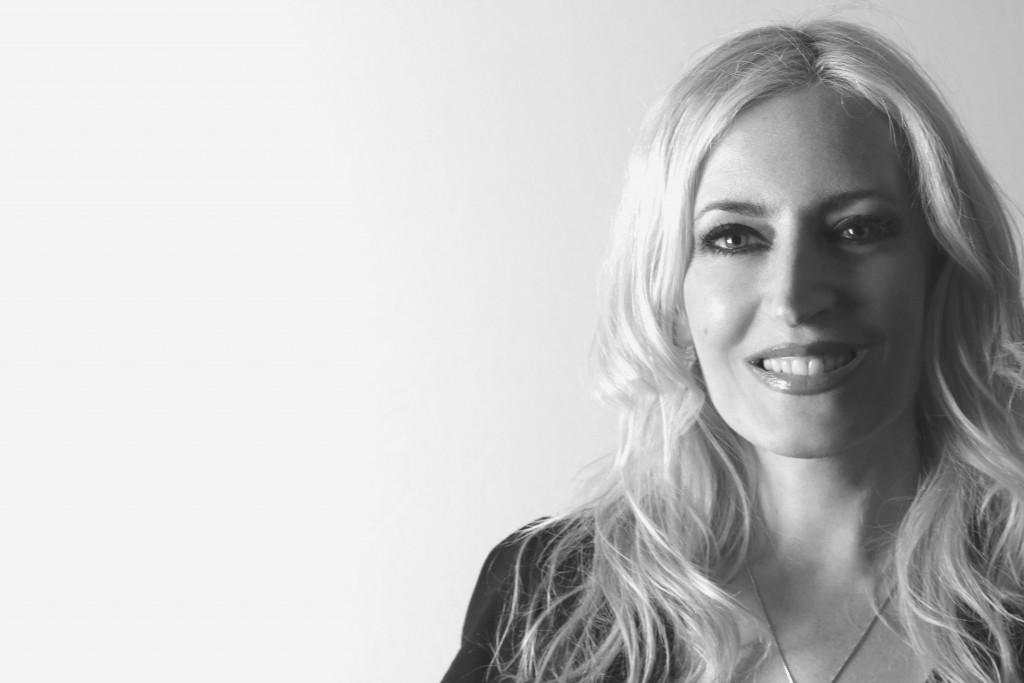The WiMN’s Front and Center is a weekly column that showcases accomplished women who work in the music and audio industries. We spotlight successful female performers, manufacturers, retailers, educators, managers, publicists, and everyone else in between. Want to be featured? Learn how here.
Front and Center: Singer, Composer, Pilot, Global Outreach Coordinator at SENS Research Foundation, Maria Entraigues-Abramson

L.A.-based singer, composer, pilot and SENS Research Foundation Outreach Coordinator Maria Entraigues-Abramson is a force to be reckoned with.
Armed with a hauntingly beautiful voice, a commanding presence, and a skill set as broad as the skies she flies as a private pilot, Entraigues-Abramson has graced audiences all over the world with her voice, performing with acts ranging from Latin icon Ricky Martin to Japanese superstar Eikichi Yazawa.
Originally from Argentina, Entraigues-Abramsom graduated from Berklee College of Music and established a solid reputation working with the biggest movie producers composing music for films.
She is fascinated by science and currently serves as the outreach coordinator for SENS Research Foundation, a non-profit organization located in the Bay Area working to develop new therapies to prevent, reverse and eradicate the diseases of aging.
Entraigues-Abramson is fluent in Italian, English and Spanish, and has an affinity for all sorts of animals. Learn all about her at www.mariaentraigues.com.
WiMN: You were the cultural attaché to the Consulate General of Argentina in Los Angeles for three years. What are some highlights from your tenure there?
MEA: My experience at the Consulate was great. I must say that working in the world of Diplomacy made me acquire very valuable skills in managing negotiations and business relationships with tact and the least amount of friction possible. The “art” of diplomacy is definitely very interesting; you discover new ways of solving a problem when all resources seem to have been exhausted. You learn that there’s always a strategy so that something good can come out of a losing situation. In the same way that when you need to say “no” to something, there is always a way to work around it so that you don’t actually have to say “no,” but instead you can say “yes” to something else, and still make the outcome a positive one. One could easily say that diplomacy, just like music, can be very creative! 😉
WiMN: You’ve performed with huge acts like Ricky Martin, Alejandro Sanz, Luis Miguel, and more. Tell us some of your most memorable touring experiences.
MEA: I have so many stories and anecdotes from my many years on the road. It has always been fun and very exhausting at the same time. When you tour, you are everywhere and nowhere: hotels rooms, venues, and cities get all mixed up in your head and you don’t really get to see anything. The schedule is usually very tough on your body; you are always packing and always unpacking. You don’t sleep much so your voice can be affected, and sometimes it can be very challenging to have a good healthy meal, etc.
All that said, I have some amazing memories. One of them is while touring with super rock-star Eikichi Yazawa in Japan. Someone came and told us we were about to get on stage. I was feeling the butterflies in my stomach like I always feel, my heart racing with excitement and a smile on my face I couldn’t help but having.
Suddenly the curtains, almost like with a magical trick, are lifted and totally gone in a matter of seconds, fireworks all along the edge of the main stage go off into huge flames and sparks, it is totally blinding for a moment, the whole venue is as bright as you can imagine and as the heavy rock music starts the fireworks die down, and this is when the unexpected happened – right at that moment, the 90,000 humans in the audience uttered a full, deep, prolonged roar expressing their excitement and I was literally, physically pushed back by something that felt like the shock wave of an explosion!
Later I found out that my colleagues felt the same blast blowing their hair back and all, but were not as strongly moved as I was, maybe cause someone who weighs 97 pounds can be pushed easier (not that my colleagues were heavy but I am definitely very light ;)). I will never forget that surrealistic moment.
Maria Entraigues-Abramson performing with Japanese superstar Eikichi Yazawa in Japan:
WiMN: You were also heavily involved in music composition for film and TV. What’s one thing you wish everyone knew about what goes into composing music for film and TV?
MEA: I had the pleasure of being involved in the creation of several film scores and songs for movies. From composing, song-writing and singing/acting to music production, music copying and contract negotiation.
A film I remember very dearly is L’imbroglio Nel Ensuolo (the trick in the sheet). Maybe because I also have a scene in it in which I sing “Quando men vo” from the famous opera La Boheme. The movie was filmed in Italy with Maria Grazia Cucinotta and Geraldine Chaplin. It was directed by Mexican director Alfonso Arau, who directed the big hit Like Water for Chocolate, which at the time was the biggest foreign film in the United States.
The cinematography was done by the legendary Oscar winner Vitorio Storaro, and the music was co-composed by Ruy Folguera. This is one of those films that are a real piece of art, every frame of it! Arau has a different approach when it comes to the music of the film.
Usually the film composer enters “the picture” when the movie is finished, music is considered post-production, but not with Arau. He likes to work with the music from the beginning and likes music to be written as he films. He likes to envision as much as he can of the finished product while he is shooting. So what he does differently is to bring the composer and editor along during the whole filming.
Both heads of department will travel with the necessary equipment and have it at the set or hotel, and in whatever part of the world the movie is being shot. As he films and receives the dailies or rushes, he starts editing right away and asks the composer for music to use during this preliminary editing process, so the musician will be composing the actual score as they edit and no temp-score will be used, as it normally happens otherwise.
Obviously the music is properly recorded later and these will just be demos, but in this way these two very creative processes advance together and they kind of feed each other. The other reason why Arau does this is to inspire the actors, he would ask for a music cue for a particular scene and then this music would be played in the set right before and after shooting. In this way the actors will know exactly what the music will be like for that scene and having this information will make things very different in their performance. I think is a great system, I wish all movies were done like that.
I will never forget the months spent in Naples and Sicily filming, and then post-production in Rome. I feel very thankful to Alfonso Arau whom I worked with in five of his films, he’s not only been a great mentor and teacher to me but he’s also been like a father. Great memories that will stay with me forever.
WiMN: You’re fluent in Italian, English and Spanish. Do you prefer singing in one language over another? If so, why?
MEA: As I grew older I’ve become more and more of a purist in this subject. I believe that music is best sung in its original language, in the language that was conceived. If you are a singer growing up in Argentina you will probably learn to copy, to imitate, unless you are singing tango or folkloric songs, otherwise you are basically translating and emulating a style that doesn’t originally belong to your culture. Of course you don’t see it like that when you grow up there. It took me years to see it the way I see it now, but now after being in the United States for over 23 years I feel it very clearly when I sing. I have recorded many things in Spanish that were not in a style born in a hispanophone country and I still enjoyed it, I am not saying it is impossible at all, but I feel a huge difference when I sing jazz in English, opera in Italian and tango in Spanish; they just belong together 🙂
WiMN: How did you become interested in being a pilot?
MEA: The main drive to do this was fear of flying! Yes, believe it or not that was exactly what lead me to do it. I’ve always tried to take fear by the horns, I don’t like fear to control me and this was what was happening to me after flying around the world non stop since I was a little girl and always loving it. In my late 20’s for a mysterious reason, I started suffering from panic attacks while onboard commercial flights. It usually had to do with bad weather or strong turbulence situations. This couldn’t happen to me! I had to travel all the time while singing and touring, also to visit my family in Argentina and Europe. Plus I’ve had always loved flying and space exploration, crazy for me to be scared of it! The attacks where getting worse.
While going through the fear I would feel the strong need to ask the pilots questions, so after the turbulence had passed, I started to request a visit to the cockpit (you could still do this before 9-11). I noticed that when I was with the pilots and got things explained, I immediately felt better! Nothing is better than knowledge; it is much easier to fear things when you don’t know them.
One night after watching the movie Aviator I decided I was going to call the nearest flight school and try a flight lesson, I figured learning to fly myself will give me the deepest insight and knowledge. I started flying at the Burbank, Calif., airport, and I was super lucky to find the best teacher I could have found.
I woke up in the middle of the night and couldn’t sleep thinking of the incredible thing I had just done! It was so magical, I was flying an airplane!! The feelings of freedom and power are unparalleled.
I started doing very short lessons; sometimes it would only be 15 minutes, and my teacher would tell me, “It’s okay, next time you’ll do better.” And just like that I became a pilot! My first solo was unforgettable. While we were practicing landings he suddenly stopped on the runway and told me, “You are on your own, you are ready.” I looked at him panicking and asked “Are you sure?” And he replied, “Completely, you need to fly off the nest, little bird…”
So I did, once I was airborne I felt I had forgotten everything I knew and thought to myself, who is going to land this machine now? My legs were shaking, my mind was blank, so I decided to sing out loud and that brought me back to firm land! Music has always been and will always be what connects me to myself, what keeps me grounded. Funny, in this case music brought me back to the ground. I enjoy flying together with my dearest love, my husband Gary, who is also a private pilot.
“Once you have tasted flight, you will forever walk the earth with your eyes turned skyward, for there you have been, and there you will always long to return.” -Leonardo Da Vinci
Entraigues-Abramson flying along with Team Oracle lead by Sean Tucker, featuring her voice dubbed for a Bambi Disney movie direct to DVD.
WiMN: What are your current musical projects?
MEA: I am working on an electronica album. At this point I can’t tell you much about it since it’s such a particular project that needs to be seen and heard to be explained. I am very excited about it.
WiMN: You’re currently the Global Outreach Coordinator for SENS Research Foundation. How has your experience as a singer and composer helped you with this role?
MEA: As you can probably tell I can’t stay on just one thing. I’ve always had this unstoppable curiosity since I was a little girl, and science has been one of my other big passions.
SENS Research Foundation is a non-profit organization located in the Bay Area, working to develop new therapies to prevent, reverse and eradicate the diseases of aging. As we age we accumulate damage at a cellular and molecular level, that happens since we are born.
This damage or “junk” as we call it, doesn’t bother us much until we start getting older. When the amount of waste crosses a certain threshold it starts affecting the functions in our body and we get sick. If we live long enough, in the way medicine is today, we will get at least one age related disease (cancer, Alzheimer’s, cardiovascular disease, Parkinson’s, etc) if not several, and if we don’t die of something else before, this is what will eventually kill us.
At SRF we have a roadmap to get aging under medical control. These strategies (Strategies Engineered for Negligible Senescence) were designed by Biogerontologist Dr. Aubrey de Grey, a very prominent scientist from Cambridge, U.K., who co-founded the organization and is our Chief Science Officer. He wrote the book Ending Aging where he explains the seven types of damage that make us age and how we can tackle them using regenerative medicine. This is what we work on.
My work as the Global Outreach Coordinator is mainly development and fund raising. I focus on creating new relationships, bringing high net worth Individuals onboard. I do celebrity outreach, organize events, and anything that will help create awareness and raise funds to push the research and the development of treatments forward. These cures will happen, it is just a matter of time, and the more funding we get the faster it will happen.
The fact that I’ve been in the music/entertainment business for so long helped me build a huge network of people and this is how I can do my job doing outreach for the organization, it is all about making connections and expanding our network.
WiMN: Tell us about your passion for cryonics. How did that come about?
MEA: I know I talk a lot about my passions here, but cryonics is not really a passion of mine, cryonics to me is a resource, or “plan B” as I like calling it. If the therapies to cure age-related disease are not ready before I die, I have plan B. Cryonics is a well-established science, used today to preserve organs, embryos, umbilical cords, etc. It is a technology that uses very low temperatures plus chemicals to cryopreserve cells almost intact.
What would normally take a second in our bodies to decay once we are dead, while being cryopreserved or in “suspended animation,” it will take about 24 million years, we can literally be frozen in time. Having this in mind is that some organizations exist where they preserve whole bodies.
WiMN: Tell us a little-known fact about yourself.
MEA: I love animals, I grew up surrounded by dogs, cats, birds and monkeys, yes, monkeys! My mom and I were crazy about animals and would build these big habitats at home and raise all kinds of parrots and other birds, and also had different types of monkeys. We took them everywhere with us; it used to make my father furious.
Now this would probably be very illegal and I am very glad it is that way. I know having these animals at home was not a good thing to do cause they don’t belong in a house and also cause by buying them we would help this black market grow. Now I know better.
Were very loving and took really great care of them, and being so close to these incredible beings made me appreciate them very much.
WiMN: Who were your biggest musical role models growing up?
MEA: So many, but some were Aretha Franklin, Chaka Khan, Whitney Houston, Lola Flores, Prince, Barbara Streisand, Maria Callas, Stevie Wonder, Ella Fitzgerald, Sting, and Björk.
WiMN: Anything else you’d like to share?
MEA: I write a monthly article about “The Voice and Singing” for Músico Pro by Music Makers Publications, which is the biggest music magazine in Spanish, under the direction of awesome editor in chief Fernando Curiel.








